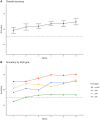Constraints on novel word learning in heritage speakers
- PMID: 38694429
- PMCID: PMC11061516
- DOI: 10.3389/fpsyg.2024.1379736
Constraints on novel word learning in heritage speakers
Abstract
Introduction: Recent research on word learning has found that adults can rapidly learn novel words by tracking cross-situational statistics, but learning is greatly influenced by the phonological properties of the words and by the native language of the speakers. Mandarin-native speakers could easily pick up novel words with Mandarin tones after a short exposure, but English-native speakers had specific difficulty with the tonal components. It is, however, unclear how much experience with Mandarin is needed to successfully use the tonal cue in word learning. In this study, we explored this question by focusing on the heritage language population, who typically are exposed to the target language at an early age but then develop and switch to another majority language. Specifically, we investigated whether heritage Mandarin speakers residing in an English-speaking region and speaking English as a dominant language would be able to learn novel Mandarin tonal words from statistical tracking. It helps us understand whether early exposure to the target feature is sufficient to promote the use of that feature in word learning later in life.
Methods: We trained 30 heritage Mandarin speakers with Mandarin pseudowords via a cross-situational statistical word learning task (CSWL).
Results and discussion: Heritage Mandarin speakers were able to learn the pseudowords across multiple situations, but similar-sounding words (i.e., minimal pairs) were more difficult to identify, and words that contrast only in lexical tones (i.e., Mandarin lexical tone) were distinguished at chance level throughout learning. We also collected information about the participants' heritage language (HL) experience and usage. We did not observe a relationship between HL experience/usage and performance in tonal word learning, suggesting that HL exposure does not necessarily lead to an advantage in learning the target language.
Keywords: cross-situational word learning; heritage language phonology; heritage speaker; lexical tone; statistical learning.
Copyright © 2024 Ge, Rato, Rebuschat and Monaghan.
Conflict of interest statement
The authors declare that the research was conducted in the absence of any commercial or financial relationships that could be construed as a potential conflict of interest.
Figures



Similar articles
-
Explaining L2 Lexical Learning in Multiple Scenarios: Cross-Situational Word Learning in L1 Mandarin L2 English Speakers.Brain Sci. 2022 Nov 25;12(12):1618. doi: 10.3390/brainsci12121618. Brain Sci. 2022. PMID: 36552078 Free PMC article.
-
Adult Learning of Novel Words in a Non-native Language: Consonants, Vowels, and Tones.Front Psychol. 2018 Jul 24;9:1211. doi: 10.3389/fpsyg.2018.01211. eCollection 2018. Front Psychol. 2018. PMID: 30087631 Free PMC article.
-
Event-related potentials of familiar monosyllabic words with unexpected lexical tones: A picture-word study of Mandarin-speaking preschoolers with and without a history of late talking.Dev Sci. 2024 Nov;27(6):e13553. doi: 10.1111/desc.13553. Epub 2024 Aug 7. Dev Sci. 2024. PMID: 39113280
-
Chinese-English Speakers' Perception of Pitch in Their Non-Tonal Language: Reinterpreting English as a Tonal-Like Language.Lang Speech. 2021 Jun;64(2):467-487. doi: 10.1177/0023830919894606. Epub 2020 Jan 3. Lang Speech. 2021. PMID: 31898931
-
Categorical perception of lexical tones by English learners of Mandarin Chinese.J Acoust Soc Am. 2016 Dec;140(6):4396. doi: 10.1121/1.4971765. J Acoust Soc Am. 2016. PMID: 28040029
References
-
- Best C. T., Tyler M. D. (2007). “Nonnative and second-language speech perception: commonalities and complementarities” in Second language speech learning: The role of language experience in speech perception and production. eds. Munro M. J., Bohn O.-S. (Amsterdam: John Benjamins; ), 13–34.
-
- Chang C. B. (2016). Bilingual perceptual benefits of experience with a heritage language. Biling. Lang. Congn. 19, 791–809. doi: 10.1017/S1366728914000261 - DOI
-
- Chang C. B., Haynes E. F., Yao Y., Rhodes R. (2010). “The phonetic space of phonological categories in heritage speakers of Mandarin” in Proceedings from the 44th annual meeting of the Chicago linguistic society: The Main session. eds. Bane M., Bueno J., Grano T., Grotberg A., McNabb Y. (Chicago, IL: Chicago Linguistic Society; ), 31–45.
-
- Chang C. B., Yao Y. (2016). Toward an understanding of heritage prosody: acoustic and perceptual properties of tone produced by heritage, native, and second language speakers of mandarin. Herit. Lang. J. 13, 134–160. doi: 10.46538/hlj.13.2.4 - DOI
LinkOut - more resources
Full Text Sources

